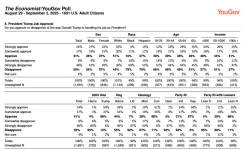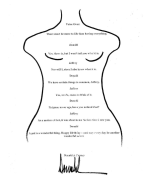A couple of comments on that best to worst ranking:
1. It's inherently subjective, so you always have to consider the source of the ranking. The American Political Science Association is certainly not a haven of partisanship (it's more of an academic/historians group), but I would concede that there is a bit of liberal slant in this ranking.
2. I think any ranking of Presidents should specifically exclude Presidents whose last term in office ended less than, say, forty years ago. It takes some time for perspectives on a President's accomplishments and defaults to settle and crystallize, and for partisan considerations to become less influential in evaluating his ranking. I am personally a big Obama fan, but No. 7? He likely gets a bump for being the first black president, but I wonder if he will remain at No. 7 several decades from now. Biden seems too high, as well.
3. I think LBJ is too highly ranked, and there's no way I'm putting George Washington any lower than 2nd. Perhaps the biggest inaccuracy is putting James K. Polk (our 11th President) at No. 25. Over the years, I've seen him consistently ranked between 5 and 10 in these rankings. Most Americans these days have zero knowledge of his accomplishments, but they were considerable. Check this out:
Throughout his controversial time in office, President Polk successfully added vast amounts of land and strengthened the U.S. economy. Nationalism grew through the Mexican-American War. Polk established his administration through the continuous expansion of American territory. The Mexican-American War started in 1846 after American soldiers invaded Mexican land located near Texas borders. Through the 1848 Treaty of Guadalupe Hidalgo, the United States paid $15 million to acquire California, New Mexico, and the Texas border and fulfill its Manifest Destiny goals, thus obtaining parts of seven states. Meanwhile, Polk's 54-40 or Fight! Although his 54-40 or Fight! slogan advocated for Oregon sovereignty nationwide, the United States obtained the U.S.-Canada border at the 49th parallel, thus escaping potential dual conflicts against Mexico and Britain at the same time.



 Trump just reminded the press they should be GRATEFUL for the amount of access he gives them
Trump just reminded the press they should be GRATEFUL for the amount of access he gives them






